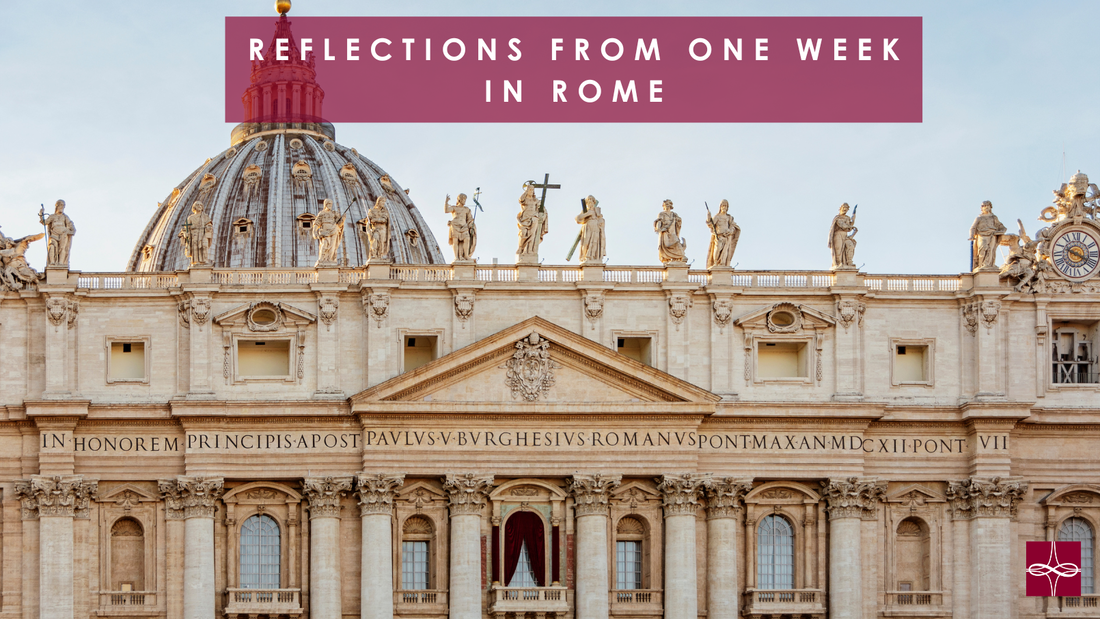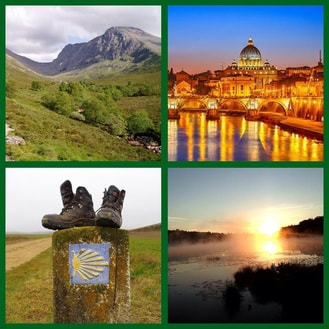|
In July, I had the opportunity to attend the Summer Leadership Development Program with The Lay Centre in Rome. I spent one week in the Eternal City and it was such a wonderful experience! Going into the week, I was not exactly sure what the program would entail. I knew that it was a leadership program for young people in the Church to better understand their call to leadership, but I was not sure what the actual program itself would be like. This also was the first time that I had traveled internationally by myself! I was both excited and nervous at the challenge. What do I do if my flight gets delayed? What if I am unable to find a taxi at the airport? What if I get lost trying to find the entrance to the Lay Centre? All these questions (and more) circled around in my mind as I prepared for the trip. I boarded my flight at JFK Airport in New York and arrived smoothly in Rome on a sunny Friday afternoon (first fear of my flight getting delayed was avoided) and I successfully found a taxi to take me from the airport to the Lay Centre (second fear tackled). Finally, I was welcomed into the Lay Centre by their wonderful staff and began to settle myself into my new home for the next week (third fear conquered!). My first day and a half in Rome was free time, to adjust to the time difference and explore the city. I enjoyed walking past the Colosseum from our accommodations at the Lay Centre and over to the Trevi Fountain where I would get a gelato to enjoy on my walk back. It was such a great start to the trip! I also began to chat with the other participants of the program; we all stayed in the same hall with our own rooms and shared a bathroom with one other person. It was a similar layout to what you may see in a dorm room. I was one of four participants from the United States, the other twenty or so were from all over the world - from Cameroon to South Korea to Afghanistan - there were so many different cultures to learn from. I really saw the work of the Lord through all these people. It was so interesting to see that we all come from different backgrounds, but all had one thing in common - a love for the Church. We spent the week learning about leadership: What does it mean to be a leader? How can we be effective leaders? What does it mean to allow the Lord to move us as leaders? How can we lead with the morals Jesus taught us? We sat through various presentations from different religious communities and learned about the models of leadership through St. Benedict and St. Ignatius Loyola, as well as reflected on our own individual leadership styles and strengths. All of these discussions bore many fruits throughout the weeklong program and spurred great conversations about the importance of faith in leadership. Each of us brought our own, individual idea of leadership and we were able to grow on models that others brought to the table. Each day, we began with morning prayer, and we were encouraged to volunteer to share a prayer exercise with the group. One of my favorites was learning and participating in the Taize prayer. I have always enjoyed prayer through music, but I had never experienced this meditation technique. It was very calming and helped me to put my focus on the Lord. We ended each day with evening prayer followed by dinner, which we ate together as a group. Sharing meals together as a group and telling stories from our own experiences and backgrounds really helped to strengthen our bond as a group. Every meal was filled with inquisitive insight, laughter, and joy (as well as delicious home cooked Italian food!). I had never lived in a community before; I had lived in a dorm for several years in college, but I had never experienced community life like this. It was such a great experience! Everyone was so welcoming, warm, friendly, and always went out of their way to help one another. Whether it was helping me carry my suitcase to the fourth floor, filling up my glass at dinner, or lending me a bus ticket, I was struck by the selflessness of others. In reflection, I experienced so much growth during this one week abroad. I grew in my confidence of solo travel, I grew in my professional life by learning various leadership skills, I grew in my personal life from meeting so many people of different cultural backgrounds, and I grew in my spiritual life through our studies of the saints. I am so thankful to have been given the opportunity to attend the Summer Leadership Development Program and will continue to grow from the experience for years to come.
0 Comments
For much of the past year my work as an auditor has had me traversing the country each week by plane, train, and automobile to attend to various client needs. The destinations often change depending on the assignment; one week it might be Philadelphia and the next it might be Los Angeles, one month it could be Denver and the next Minneapolis. While exploring new cities and meeting new people is exciting, I’ve also found incorporating the logistics and time it takes to go from point A to point B each trip adds another layer of exhaustion onto what is usually an already busy schedule. On a recent Monday morning flight, while praying Morning Prayer, I came across this reading from Isaiah 55:6,8-9; Seek the LORD while he may be found, call upon him while he is near. For my thoughts are not your thoughts, nor are your ways my ways—oracle of the LORD. For as the heavens are higher than the earth, so are my ways higher than your ways, my thoughts higher than your thoughts. I looked out my window at the view from 35,000 feet and saw an expanse of plains surrounding small midwestern towns that eventually morphed into suburbs and cities. In each locale there were thousands of people going about their day, unaware of the part they played in this picture I saw. “For as the heavens are higher than the earth, so are my ways higher than your ways.” I paused and thought about how God’s view of our own lives must look something like this. We, just like the people on the ground, go about our day unaware of the part we play in the bigger picture He sees. So often I find that I allow the stresses to become my sole focus of the day: a difficult audit assignment, a cancelled flight, maintaining relationships with friends and family while on the road, etc. While these daily stresses need our attention, in the big picture of our lives they are small blips on the radar that we can’t allow to distract us from seeking the Lord. Ultimately it is our continuous pursuit of God that allows us to press through our daily challenges, large or small, trusting in the knowledge that He has the view of our lives from 35,000 feet and will never fail us. Questions for Reflection: Is there an instance or time in your life when things didn’t go according to your plan? Has God’s way of doing things in your life ever proven more fruitful or beneficial than you could have anticipated? Finding love takes patience and time. I am blessed to be in a relationship with someone I have known for over three years. What started as a friendship has become the kind of relationship I used to dream about. We love to do things like going on trips or just grocery shopping - it’s sharing experiences that means the most to us. Sometimes the littlest things are what we appreciate in each other, like how he knows how I like my coffee at any coffee shop. In return, I know that he likes ice in his glass of milk and likes getting homemade gifts for holidays and birthdays. I’ve tried to build both my friendships and relationship on shared experiences. I love getting to know someone, finding things in common, learning their interests, and spending time with that person. As a Catholic, I’ve tried to surround myself with people who support me and share my beliefs and focus in life. I get to wondering though, what is dating like for other Catholics? Where can we start?
Start at the beginning. In 1 Corinthians 13: 4-7 it says, “Love is patient and kind; love does not envy or boast; it is not arrogant or rude. It does not insist on its own way; it is not irritable or resentful; it does not rejoice at wrongdoing, but rejoices with the truth. Love bears all things, believes all things, hopes all things, endures all things.” This verse is a great place to start. When we appreciate God’s love for us, we can better understand how we deserve to be loved by others. Pope Francis speaks often about love, and when he visited the United States at the World Meeting of Families in Philadelphia, he said, “Love is shown by little things, by attention to small daily signs which make us feel at home. Faith grows when it is lived and shaped by love. That is why our families, our homes, are true domestic churches.” So whether you are in a relationship or not, here is a list of little things to remember as you persevere in your lives.
For all of you who are dating, see if you are incorporating these tips into your relationship. If not, give some of them a try. For those of you reading this who are not in relationships, some of these tips can really help friendships and even relationships down the road. I’ve found that with patience and effort, the little things will amount to bigger memories. In the meantime, it’s the little things that make a relationship resilient. The “I love you!”s and the laughter can be the little things that take the day-to-day interactions and turn them into months and years spending time with someone you care about. For resources on Marriage and Family, please click here. As I looked from the trail, I saw a beautiful, soft mist that seemed to be gently kissing my face. There was a purple hue on the vast fields of heather ahead; while the surrounding foliage was the brightest green that I'd ever seen. There was a soft breeze that gently traveled through the glen and seemed to be the words of encouragement I needed to keep climbing; to keep pushing. In the distance there was a long loch that seemed to stretch for miles and miles. In the air if I stopped and listened, I swear that off in the distance a lone bagpiper was playing. In this moment, I finally gained appreciation for the country of my ancestors. I was in Scotland, climbing Ben Nevis, the tallest peak in the country. I was on a pilgrimage through land of my ancestors. My grandfather's family hails from the northern most island in the Orkney Islands called North Ronaldsay. The Tulloch's were proud members of Clan Ross, and were happy to wear the family tartan. I thought I had found paradise, and I didn't want to leave. Many years later, I was walking down a cobblestone street and found another paradise. I could hear bells tolling and I could smell another phenomenal dish being served at a sidewalk restaurant. There was a clear, deep blue sky above, even on New Year's Day. It did not take very long to actually hear a musician playing a familiar country tune. I went from church to church walking with the saints. This was the city of Rome, in all its glory. As I wandered the streets with our pilgrimage group, eating gelato, I thought to myself that this place also was paradise and I didn't want to leave. In a way that's what pilgrimages do. They transport us to a new location, both physically and spiritually. This Saturday is the feast of Saint James the Apostle. St. James was one of Jesus' first disciples, was present for the transfiguration, and it is believed that he was the first apostle to be martyred. After his death, his remains were transported to Spain and he was buried at Santiago de Compostela. This site has become one of the greatest pilgrimage locations in the world called El Camino, The Way of St. James. Pilgrims since the Middle Ages have been making the trek in northern Spain. It can take a pilgrim several months to complete, depending on which route they take, and the pilgrimage is becoming increasingly popular. In 1985, records show that approximately 700 pilgrims made the trek, but by 2010 there were nearly 273,000 pilgrims that set out to complete the Way of St. James. This popular pilgrimage was documented in the 2010 movie The Way, starring Martin Sheen and written by his son, Emilio Estevez. Pilgrimages can be anywhere and can take any kind of form. We can travel to distant places, far from home, or we can visit somewhere close to home. Pilgrimages are meant for us to find ourselves and to deepen our relationship with God. When we walk with a friend, we chat and get to know them better, and the same is true when we walk with God. As we move forward in life, we are never done with our journey. When we rejoice, God is there rejoicing, and when we cry, God is there too, comforting us. Pilgrimages remind us of this. If we can seek God in all places then one does not have to be in the Scottish Highlands, in the streets of Rome, or on the Camino to be on pilgrimage. We can go anywhere and we will be on our way to find God. Patrick Fricchione is the Research and Production Associate for the Catholic Apostolate Center
To learn more about Martin Sheen and his Catholic Identity, check out this webinar where Sr. Rose Pacette, FSP discusses the faith surrounding this actor and the stories that shaped his Catholic Faith: It has been about a year since I told my students that I would not be returning as their Religion teacher. I decided that I was moving back to Los Angeles at the end of the school year. I wanted to be back with my family especially my mom and two young nieces. I was burned out from teaching. And perhaps most importantly-I wanted to travel and explore the world. I wanted to do and achieve great and glorious things. At 25 years old, I was incredibly restless with my life.
At the beginning of his Confessions, St. Augustine writes his most famous and oft-quoted line: “For You have made us for Yourself, and our hearts are restless until they rest in you.” Throughout the first ever spiritual autobiography, Augustine bares his soul for God and for generations of people to read and understand. As a young man and even probably as an old Bishop, Augustine was a restless man searching and struggling for salvation. He was lonely and frustrated. He sought material goods and earthly pleasures. Yet it was not until he accepted God-rested in God-that he found peace. As I began to plan my travels, I remained open to any opportunity that would come before me. All I knew was that I wanted to see as many diverse places as possible and I wanted to do as many exciting things as possible. Thus, I hiked the 42 km Inca trail over four days to see Machu Picchu. I prayed at the Western Wall and knelt at the site of the Crucifixion. I saw my beloved Notre Dame get demolished in the National Championship game. I toured the White House and became breathless at the site of the Oval Office. I went on a medical mission in India and volunteered in various villages. I fulfilled “bucket list” places to see such as the Taj Mahal, Petra, and the Pyramids. It was an incredible blessing to be able to see and experience all these places, meet interesting people, and create such lasting stories and memories. However, I did not find the peace that I was searching for in my journeys. I sought it, prayed for it, and longed for it. And yet, it was not there. Despite all the miles I flew and the cool photos I took with Instagram, my heart was not at rest. Or at least not the rest I was hoping for. Nevertheless, when I look back on this year off, I notice the times that I felt at most peace were the days I spent with my nieces, Stella and Lauren. Stella is 3 and is incredibly precocious; she speaks both Korean and English, lectures us on how to listen better, and sings beautifully. Lauren is 1 and there is nothing in the world like her smile and her laugh. It has given me such immense joy to be with them, hold them, play with them-a joy that surprised me and builds upon itself. Seeing these two girls grow up and being present to them in very ordinary ways has given me peace that all the extraordinary sights in the world could not. When she read Confessions, my mom commented that St. Augustine and I shared some traits in common. We both love public speaking. We both have strong mothers who worry about them. And we both have a “healthy” amount of “confidence”-to put it lightly. All I can hope is that I find the rest in God that he pursued and ultimately found. Tae Kang has his MA in Theology from The University of Notre Dame through the Echo Faith Formation Program and has worked both as a Lay Ecclesial Minister in a Parish and as a High School Religion Teacher. The night before I travel - whether by car, air or sea - I can’t help but begin to feel anxious and get a little overwhelmed about my upcoming journey. No matter how prepared I think I am or how necessary the trip is, I loathe the process of travelling. I’ve never had a ‘bad’ experience, but it isn’t something on my list of things to do every day either. While I’m sure I’m not alone in my sentiment, and there are probably 101 diagnoses as to why I don’t like travelling, I think it boils down to the fact that transition, no matter the circumstances, causes an upheaval of routine.
Throughout our lives, each of us has experienced the anxieties of transition in one way or another: graduating from school and starting a new job; getting married and having children; getting sick or losing a loved one. Every stage of our lives carries with it transition and to some extent, a change in routine. The Book of Ecclesiastes acknowledges this idea in a very poetic way: “There is an appointed time for everything, and a time for every affair under the heavens” (Eccl 3:1). The start of Ordinary Time is no different. While most of us would consider this transition as minimal, the truth is our ‘routine of solemnity’ has come to somewhat of a standstill for the next month. The Solemnity of the Presentation of the Lord (on February 2), and the memorial of Our Lady of Lourdes (on February 11) are among the highlights, but for the non-daily Mass crowd, they will be passed over with little thought. So, the question then becomes, what are we to make of these next few weeks? With less than a month before we begin our celebration of Lent with Ash Wednesday, many of us are tempted to ask what good these next four weeks of green - of Ordinary Time - truly serve? In fact, we might be tempted to brush them aside and regard them as a welcomed break in our otherwise hectic liturgical year. I would suggest, however, that looking at these next four ordinary weeks is essential to our spiritual well-being. Our Catholic faith has a rich history of using the ordinary to reveal the extraordinary. Our sacramental life is centered around the idea that ordinary elements - bread, wine, water, oil, gestures and even people - through the grace of God, constantly reveal extraordinary truths. Even in our secular day to day interactions, we believe that God reveals himself to us through the kind word or action of an ordinary passerby; oftentimes to our amazement. Both the Old and New Testaments tell countless stories of God using ordinary people to bring about His extraordinary plan of salvation: Abraham, Moses, David, Elijah, Elisha, Daniel, Jonah, John the Baptist, Peter and Paul, just to name a few. The lives of the saints and martyrs are no exception. Ss. Francis, Therese of Lisieux, Jerome, Vincent Pallotti, Elizabeth Ann Seton, Francis de Sales, among thousands of others, beautifully exemplify living ordinary lives for the sake of an extraordinary message. Knowing and understanding how God uses the ordinary should be a great source of hope for each of us. It is an invitation for each of us to strip away what we think we need to be and come as we are; in other words, for us to recognize the beauty of our own imperfect humanity. It is through our participation in the ordinary that we enter into a deeper, more honest and fruitful relationship with God, who is perfection. It’s true that this liturgical season, this transition, might bring about some uneasiness or anxiety because it is a break from our recent pomp and solemnity. For some, it might be a minimal, casual transition. And still for others, it might be off their radar completely. Whatever the case, I would suggest making these next four weeks truly ordinary. If we come as we are - as ordinary people - not just to reacclimate ourselves to a different routine, but to enter into an honest dialogue with God, I am confident He will use us in extraordinary ways. This kind of unique and authentic vulnerability is what we are called to, and why we were created. Why not take a little time to participate in it and enjoy it? On January 24th, we will celebrate the memorial of St. Francis de Sales. In his book, The Introduction to the Devout Life, he writes, “When God the Creator made all things, he commanded the plants to bring forth fruit each according to its own kind; he has likewise commanded Christians, who are the living plants of his Church, to bring forth the fruits of devotion, each one in accord with his character, his station and his calling… Therefore, in whatever situations we happen to be, we can and we must aspire to the life of perfection” (Pars 1, cap.3). As we begin this short period of Ordinary Time, we are reminded not of what we lack, but of why being ordinary is so necessary to bring about the extraordinary. We are reminded that each of us have been created as is, to bring about a life of devotion, not for our sake, but for the glory of God. In essence, we are reminded why the green of the thorn, eventually blooms into the white of the rose. Happy Ordinary Time! Jonathan Jerome is the Director of Catholic Campus Ministry at the University of Pittsburgh Johnstown. |
Details
Archives
July 2024
Categories
All
|
About |
Media |
© COPYRIGHT 2024 | ALL RIGHTS RESERVED










 RSS Feed
RSS Feed